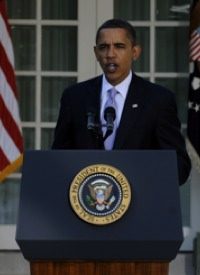
President Barack Obama gathered doctors from all 50 states of the nation to fill the Rose Garden as he once again pushed his version of healthcare reform in an October 5 speech.
To make sure the doctors would be recognized as such, the President had them all wearing their white lab coats. He said it was telling that “some of the people who are most supportive of reform are the very medical professionals who know the health care system best — the doctors and nurses of America.”
After dismissing “crazy claims about death panels” and “misleading warnings about a government takeover of our healthcare system,” Obama claimed that current healthcare reform proposals would free the physicians from being paper pushers and enable them to fulfill the oath they had taken to heal people and save lives.
Obama proceeded to combine thanking the doctors for coming with a plea for support: “I especially want to thank you for agreeing to fan out across the country and make the case about why this reform effort is so desperately needed. You are the people who know this system best. You are the experts.”
While stuffing the Rose Garden to overflowing with white-coated physicians may have given the impression that the majority of healthcare experts support the President’s proposals, the reality is quite different. Investor’s Business Daily published survey results on September 15 that show nearly two-thirds of doctors are opposed to current reform proposals.
IBD conducted the poll of randomly chosen practicing physicians in the United States by mail, and 1,376 responses had come in as of mid-September. The results show such pronounced antipathy for proposed legislation that one wonders if Obama planned the October 5 press conference to counteract the negative publicity.
According to the poll, “two-thirds, or 65%, of doctors say they oppose the proposed government expansion plan. This contradicts the administration’s claims that doctors are part of an ‘unprecedented coalition’ supporting a medical overhaul.”
Nearly half of the doctors surveyed would actually consider giving up medicine rather than operate under the proposals, something sure to exacerbate today’s shortage of healthcare professionals at precisely the time when more patients would be coming into the system: “Four of nine doctors, or 45%, said they ‘would consider leaving their practice or taking an early retirement’ if Congress passes the plan the Democratic majority and White House have in mind.”
Lastly, “more than seven in 10 doctors, or 71% — the most lopsided response in the poll — answered ‘no’ when asked if they believed ‘the government can cover 47 million more people and that it will cost less money and the quality of care will be better.’ ” This finding indicates that an overwhelming majority of medical professionals don’t believe administration claims that millions more people can be covered while simultaneously saving money and improving quality of care.
Even if some of the physicians surveyed wouldn’t end up following through on their plan to cease practicing, IBD points out that “in this country, the number of doctors is already lagging population growth. From 2003 to 2006, the number of active physicians in the U.S. grew by just 0.8% a year, adding a total of 25,700 doctors. Recent population growth has been 1% a year. Patients, in short, are already being added faster than physicians, creating a medical bottleneck.”
In the United States today, there are just 2.4 physicians per 1,000 population, which is less than the median of 3.1 found among members of the Organization for Economic Cooperation, a group considered to be the official organization of the world’s wealthy nations. IBD notes that “adding millions of patients to physicians’ caseloads would threaten to overwhelm the system. Medical gatekeepers would have to deny care to large numbers of people. That means care would have to be rationed.”
A recent Association of American Medical Colleges study found that medical school enrollment has been declining since 1980. Even at current levels of patient demand, the United States will experience a shortage of 159,000 doctors by 2025.
The last word here will be given to another doctor, one who served as a flight surgeon in the U.S. Air Force during the 1960s and who has delivered more than 4,000 babies as a specialist in obstetrics/gynecology since 1968: Representative Ron Paul (R-Texas). Dr. Paul on September 23 took five minutes on the floor of the House to outline 16 points that would play a part in any genuine reform effort that extended beyond healthcare to the legal system, tax code, and more.
Dr. Paul knows the system and is every bit as much an expert as those who President Obama gathered in the Rose Garden. If his 16-point diagnosis of the U.S. healthcare system as presented in the following YouTube video were taken to heart, America’s ills could be cured.
https://www.youtube.com/watch?v=ln6A2GhhQeg
Photo: AP Images



